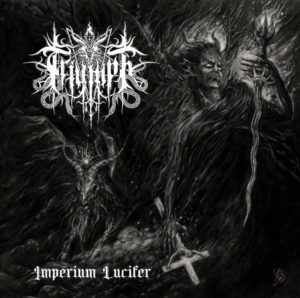 Upon receiving “Imperium Lucifer,” the latest album from the São Paulo horde TRIUMPH, sent to me by Hammer of Damnation a few weeks ago, I was astounded on multiple levels. The initial surprise was the unexpected arrival of a new release from a band that I have long admired both musically and ideologically, and that I had believed to have disbanded years ago. After all, nearly two decades have elapsed since their self-titled second album saw the light of day. The subsequent and most remarkable surprise came when I pressed play and discovered, to my utmost amazement, that “Imperium Lucifer” stands as the pinnacle of the band’s discography. As a fervent devotee of their first two albums, I assure you that this offering has truly left an indelible impression on me.
Upon receiving “Imperium Lucifer,” the latest album from the São Paulo horde TRIUMPH, sent to me by Hammer of Damnation a few weeks ago, I was astounded on multiple levels. The initial surprise was the unexpected arrival of a new release from a band that I have long admired both musically and ideologically, and that I had believed to have disbanded years ago. After all, nearly two decades have elapsed since their self-titled second album saw the light of day. The subsequent and most remarkable surprise came when I pressed play and discovered, to my utmost amazement, that “Imperium Lucifer” stands as the pinnacle of the band’s discography. As a fervent devotee of their first two albums, I assure you that this offering has truly left an indelible impression on me.
It commences with an impeccable sense of aesthetics, as if crafted by someone who profoundly comprehends that composing music is not merely an assemblage of riffs, but rather a communion—a profound dialogue between the very soul and the musical instrument—to convey an inner truth. In the case of “Imperium Lucifer,” it conveys the personal truth of Ares, the vocalist, guitarist, and primary composer. Judging by the six tracks presented herein, the inner realm of the mastermind behind this opus is relentlessly ruthless, dense, tragic, and shrouded in darkness. The album’s inception lies in the eponymous track, an intro that features a somber piano melody enveloped in dissonant noises—a sonic manifestation of the mental desolation preceding the baptism of fire in the inaugural battle. Such audial expression portrays the unwavering brutality and overwhelming intensity of the ensuing composition, “Black Sun,” in a truly terrifying manner. Ares’ guitars in this piece constitute a consummate union of unbridled violence and the most suffocating melancholy ever conceived by a human being. . Soulreaper’s stunning drumming throughout the song resembles an unrelenting barrage of machine gun fire, while Rvist’s superb bass work—evident not only in this track but throughout the entire album—surpasses the standards set by most contemporary black metal acts. The concluding guitar phrases and melodic intricacies cement this opus as the superlative composition I have encountered thus far in 2023.
Following this masterpiece, we encounter the brief acoustic interlude, “Passagem,” an oasis of tranquility that serves as an intermission between two battlefronts. However, before we can catch our breath, we are swiftly introduced to “Whispering Darkness,” a rapid black frenzy that adheres to the same premise as the aforementioned “Black Sun,” albeit with less emphasis on the melancholic aspect. This composition veers towards a more malevolent direction in its guitar work and harbors an element of controlled chaos. Regrettably, I did not have access to the album’s lyrical content, yet I find myself contemplating whether the lyrical essence of this track holds any relation to H.P. Lovecraft’s masterful short story, “The Whisperer in Darkness.” Additionally, we must acknowledge the noteworthy guest appearance of guitarist Vekum from the band Black Achemoth. On the subject of guests, it is worth mentioning the involvement of Lord Mephyr from the bands Spellforest and Cruor Cultum in the composition of the title track.
Subsequently, the instrumental piece “Outro – Deep Abyss of Coldness” follows, and although I am uncertain if this track should ideally conclude “Imperium Lucifer,” its title and sonic landscape, devoid of hope and despairing, would indeed be perfect for such an endeavor. Nevertheless, we are once again taken aback by the inclusion of the bonus track, “Warlust,” which exhibits a more bellicose tone in its aggression and, in some parts, a slightly slower pace than the preceding compositions. However, let it not be mistaken, as this is by no means a slow-paced song.
In my estimation, “Imperium Lucifer” may very well be the most bombastic comeback album of recent times. My sole reservation lies in the album’s duration, which could have been slightly longer. Nonetheless, the exceptional quality of the memorable compositions showcased here is the paramount highlight of this opus. If this release serves as a gateway to future endeavors from the band in the near future, I wholeheartedly welcome it. Another precise shot to the head delivered by Hammer of Damnation. Here, free will is nonexistent—it is unequivocally obligatory.
10/10















